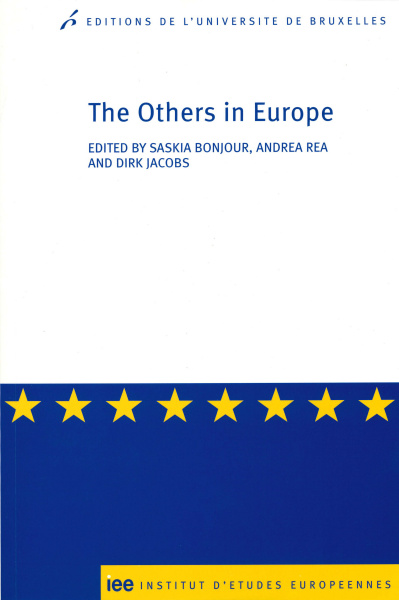The Others in Europe
Legal and social categorization in context
First Edition
This edited volume addresses the construction of identity classifications underlying the new forms of inclusion and exclusion that are to be found in contemporary Europe. Its scope covers practices of categorization and of resistance, both by majority groups. Read More
In contemporary Europe, the social tensions and political passions produced by immigration are increasingly linked to issues of belonging and identity. The representation of the foreigner is no longer solely defined by his or her place on the labour market or in the social hierarchy. In light of EU-enlargement and due to immigration flows, European societies are increasingly questioning their cultural and "ethnic identity". As a consequence, boundaries between "insiders" and "outsiders" are being redefined. The "others" in Europe are no longer merely those who do not have state citizenship of one of the member states of the Union. In the new European migration context, "otherness" increasingly refers to ethno-cultural minority groups, regardless of their EU citizenship status.
br>A mixed group of internationally established and younger scholars set out to investigate the categorisation of immigrants and their descendants as "Others" in Europe. They do so from their own disciplinary backgrounds ranging from Law, Anthropology, Sociology and Political Science to Social Psychology. This unique volume is hence trans-disciplinary in nature, shedding light from different angles on the issue of social and legal processes of categorization. The contributions analyse the continuities between the legal category of foreigner and the category of member of an "ethnicised" and discriminated minority, as apparent legal and social norms, public policies, institutional practices, social interactions and representations, as well as actors’ mobilizations, on the European, national, and local level.
Specifications
- Publisher
- Éditions de l'Université de Bruxelles
- Edited by
- Saskia Bonjour, Andrea Rea, Dirk Jacobs,
- Contributions by
- Alejandra Alarcon-Henriquez, Assaad Azzi, Didier Bigo, Philippe Bonditti, Saskia Bonjour, Emmanuelle Bribosia, Didier Fassin, Nicole Grégoire, Kees Groenendijk, Chloé Hublet, Dirk Jacobs, Julien Jeandesboz, Yves Pascouau, Pierre Petit, Francesco Ragazzi, Andrea Rea, Bruno Riccio, Julie Ringelheim, Isabelle Rorive, Maykel Verkuyten,
- Collection
- European Studies | n° 50
- ISSN
- 13780352
- Language
- anglais
- Supporting Website
- Oapen.org
- Publisher Category
- Publishers own classification > Law
- Publisher Category
- Publishers own classification > Political Science
- Publisher Category
- Publishers own classification > Sociology & Anthropology
- BISAC Subject Heading
- SOC031000 SOCIAL SCIENCE / Discrimination & Race Relations
- Onix Audience Codes
- 06 Professional and scholarly
- CLIL (Version 2013-2019)
- 3080 SCIENCES HUMAINES ET SOCIALES, LETTRES
- Subject Scheme Identifier Code
- Thema subject category: Ethnic studies
Livre broché
- Publication Date
- 24 February 2022
- ISBN-13
- 978-2-8004-1787-5
- Extent
- Total numbered pages : 298
- Code
- 1787
- Dimensions
- 16 x 24 x 2 cm
- Weight
- 580 grams
- ONIX XML
- Version 2.1, Version 3
ePub
- Product Detail
- 1 EPUB
- Publication Date
- 14 April 2022
- ISBN-13
- 978-2-8004-1788-2
- Extent
- Absolute page count : 296
- Code
- 1788
- ONIX XML
- Version 2.1, Version 3
Google Book Preview
Contents
Préface
CHAPITRE I - L'Althusser antihumaniste, ou de la coupure
1. Le problème de la « philosophie de Marx »
2. Du côté de Staline
3. Les thèses de l’antihumanisme
4. Spinoza l’antihumaniste
5. Louis Althusser entre déterminisme et liberté
CHAPITRE II - Althusser de la lecture
1. Le détour par Spinoza
2. Le Traité théologico-politique, une politique du discours
3. Lire Le Capital avec Spinoza
CHAPITRE III - Althusser de la structure
1. Du « marxisme structuraliste » à l’immanentisme spinoziste : un parcours philosophique
2. Déterminisme et coupure
3. Coupure et lecture symptômale
CHAPITRE IV - Althusser, de la conjoncture au retour du sujet
1. Penser la conjoncture
2. Le détour par Machiavel
3. Spinoza Machiavellianus
4. Interpellation et constitution du sujet
5. Est-il simple d’être spinoziste en philosophie ?
CHAPITRE V - Althusser et l’aléatoire
1. Entre la nécessité et l’aléatoire
2. La crise du marxisme
3. Les « manifestes » du matérialisme aléatoire
4. À quoi s’oppose le matérialisme aléatoire ?
5. Une conjoncture sans politique
Conclusions


If Althusser was a Spinozist...: on Juan Domingo Sánchez Estop's Althusser et Spinoza